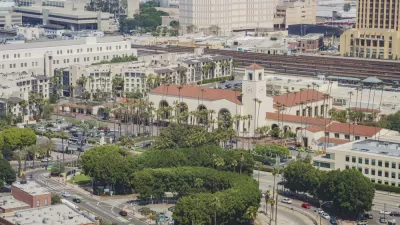Prolific and infamous developer Geoff Palmer rarely gives interviews. So it was an occasion when he appeared before an audience at the Lorenzo, his lavish student-housing complex, to recount the philosophy and practice of his controversial legacy.
Palmer is known, along with Tom Gilmore, for setting in motion the revitalization—or gentrification—of Downtown currently in full swing. In the Q&A with Planning Report publisher David Abel, he recounted how he got started developing downtown after the L.A. Riots, despite discouragement and disbelief from city planning, bankers, and brokers, let alone prospective tenants.
Ultimately, Abel notes, Palmer "changed the model" for building downtown. The $330-million Lorenzo also represents a new format for student housing, and Palmer explains the project's financial model, its relationship to USC, and the lessons learned from the development process, which was beset by opposition from neighborhood activists. Audience members, invited by the Urban Land Institute, nodded as he said, "I learned that I will not buy land that requires discretion… I’m not going to take something that I’ve got to rezone."
Palmer speaks frankly about his opposition to inclusionary housing, which he famously fought to strike down in Los Angeles in 2009, readily addressing himself to his critics. "I think it's immoral. 'Thou shalt not steal'—and certainly not by force of violence," he says.
"Why is it that these people think that real-estate developers should give 15 percent of their profits away? They don’t ask it of grocery stores, gas stations, or haberdasheries. They only ask real-estate developers. Why do these social engineers think that private individuals should be subsidizing these people? ... It’s totally un-American."
The conversation is wide-ranging and open, also covering Palmer’s trademark "Italianate" design and how his choice to build what many have called "fortresses" is a response to how he views the conditions and needs of Los Angeles.
It’s a clear glimpse into an insider perspective on the practicalities, politics, workarounds and alliances involved in becoming one of the most famous, and most contested, developers in Los Angeles.
Read the interview in The Planning Report.
FULL STORY: Palmer 'Re-Gentrified' Downtown LA, Despite Doubters and Design Criticism

Alabama: Trump Terminates Settlements for Black Communities Harmed By Raw Sewage
Trump deemed the landmark civil rights agreement “illegal DEI and environmental justice policy.”

Study: Maui’s Plan to Convert Vacation Rentals to Long-Term Housing Could Cause Nearly $1 Billion Economic Loss
The plan would reduce visitor accommodation by 25% resulting in 1,900 jobs lost.

Planetizen Federal Action Tracker
A weekly monitor of how Trump’s orders and actions are impacting planners and planning in America.

Grand Rapids Mayor Proposes Garage Conversion Plan
The mayor says allowing homeowners to convert garages to dwelling units could alleviate the city’s housing shortage.

Baltimore Ordered to Improve Sidewalk Accessibility
The city is one of many to face lawsuits for failing to comply with the Americans with Disabilities Act.

This Toronto Suburb Has More Bus Riders Than Columbus, Ohio
Brampton, Ontario used gradual improvements in service to prove that if you build it, they will ride.
Urban Design for Planners 1: Software Tools
This six-course series explores essential urban design concepts using open source software and equips planners with the tools they need to participate fully in the urban design process.
Planning for Universal Design
Learn the tools for implementing Universal Design in planning regulations.
Caltrans
Smith Gee Studio
Institute for Housing and Urban Development Studies (IHS)
City of Grandview
Harvard GSD Executive Education
Toledo-Lucas County Plan Commissions
Salt Lake City
NYU Wagner Graduate School of Public Service





























